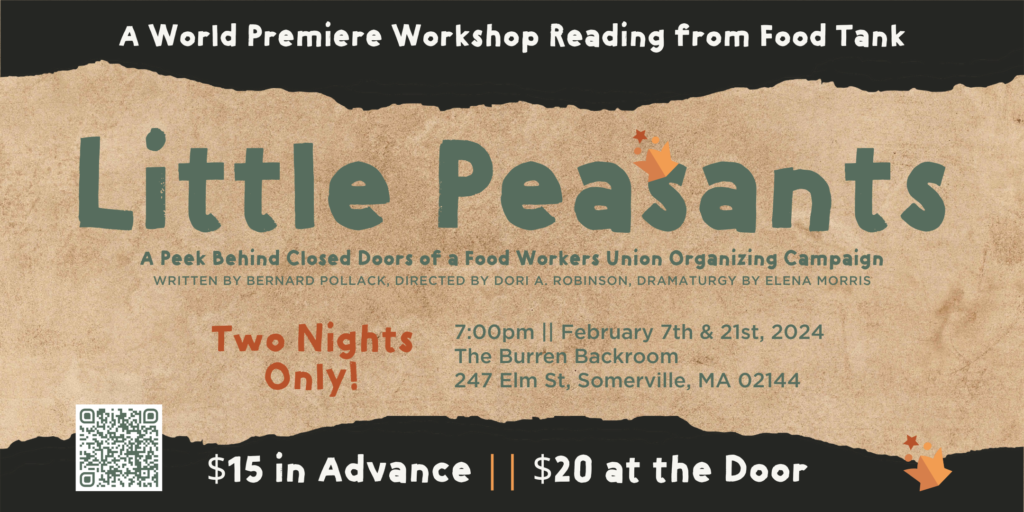
Somerville – Food Tank will present a pair of workshop performances of Little Peasants, an“immersive theatrical journey behind the closed doors of a food workers’ union organizing campaign” at The Burren on February 7th and 21st. A one-act iteration of Little Peasants was previously featured at SXSW in March of 2023 and received critical acclaim. Theater Mirror spoke with playwright Bernard Pollack and director Dori A. Robinson during rehearsals last week to learn more about the production.
Theater Mirror: What was the impetus for writing Little Peasants, Bernie?
Bernie: There has been all of this energy and activism around worker organizing, whether it was union organizing or people coming together trying to improve their working conditions, wages, benefits. These movements are happening all over the country, and of course in New England, and we were incredibly inspired by it. So Little Peasants was born from trying to showcase some of that energy.
TM: How does this translate into creating a theatrical piece?:
Dori: Bernie has created this incredible script based on many, many interviews with real people, so everything in the script is real, and he’s done a beautiful job of bringing those real characters to life. Each of the characters is quite distinct; they’re funny and quirky, and they’re actually quite lovable, even if you don’t always agree with them. I think the essential component is that it’s based on real people, and that makes all the difference. You’re not being talked at. You’re being spoken with. So it’s the difference between a conversation and just hitting you over the head with facts and figures.
TM: Little Peasants was described as an “immersive theatrical journey.” Can you expand on that for us?
Dori: The moment you cross the threshold into the space, you, as the audience member, become a barista, so you have a stake in what’s happening that evening. First of all, the actors are going to be amongst you in some moments, and they’re also going to be on stage. So you’re going to see the inner workings of what’s happening in a way that you would not normally see. You’re going to be surrounded by the experiences, and you yourself are going to be posed the exact questions that the baristas are being posed over the course of the play.
TM: Who will be asking the questions?
Dori: Some of them will come from management, but the big overall question is: What’s the right choice to make? To unionize or to not unionize? Who does it benefit, and how does it benefit them? So you’re really hearing the nitty gritty from each side, and at the end, the audience is asked to vote. Somerville is a very liberal city, and I think we have an assumption on how that vote will go. However, once you hear all the information throughout the course of the play, you’ll find that the vote will be very difficult. Because when you’re actually in the barista’s shoes, you have a bigger responsibility, and you think, “Wow! I’m not just voting based on my ideals. I’m voting based on the idea of what happens to these people first thing tomorrow. And that makes it very different because, by the end of the piece, you’re very invested in each of these people. Each of these characters is just a snapshot of some of the people who are involved in this experience every day, and I think that’s what makes it unique, and I think it will really be engaging for the audience.
TM: Bernie, I’m assuming that Food Tank has a progressive stance regarding workers in the food industry; how did you maintain a balanced point of view?
Bernie: I think the way (I accomplished that) was to have empathy for all sides. We’re so quick right now in 2024 to pick sides, so there’s no gray area. I think that with these sorts of (unionization) campaigns, there is a lot of gray area. In a dream scenario, people leave the show and don’t know the writer’s opinion about unions. That was my goal throughout, to really listen to shift supervisors and managers as part of my interview process to really understand. Nobody thinks they’re a bad person, and they’re all coming at it from different life experiences, so I really tried to understand their perspectives and arguments.
TM: This is an important and timely subject, but what’s the theatrical/entertainment quotient versus messaging?
Bernie: We really tried to make sure that the show is entertaining, funny, and vibrant and that it’s theater first and foremost. And to make theater work, I really don’t believe that you can just hammer people over the head with one point of view. Little Peasants really takes a 360° look at the issue, and I hope that both sides are unhappy at the end of the piece – that very pro-union people think that I’m doing too much service to the kind of anti-worker, anti-union group and vice versa. Food Tank’s secret is that we bring in a collection of stakeholders that would never otherwise come together. So even as we think about audiences and our outrage there’ll be a lot of folks from the food business world as well in the room. So when we talk about the difficulty of that vote at the end. (Optimally), the outcome would be) that half the time, people would vote yes, and half the time, people would vote no at the end, and then we’d feel like we’ve done a really good job.
Little Peasants – Presented by Food Tank at The Burren, 247 Elm St, Somerville, MA 02144. Tickets can bepurchased online here.

